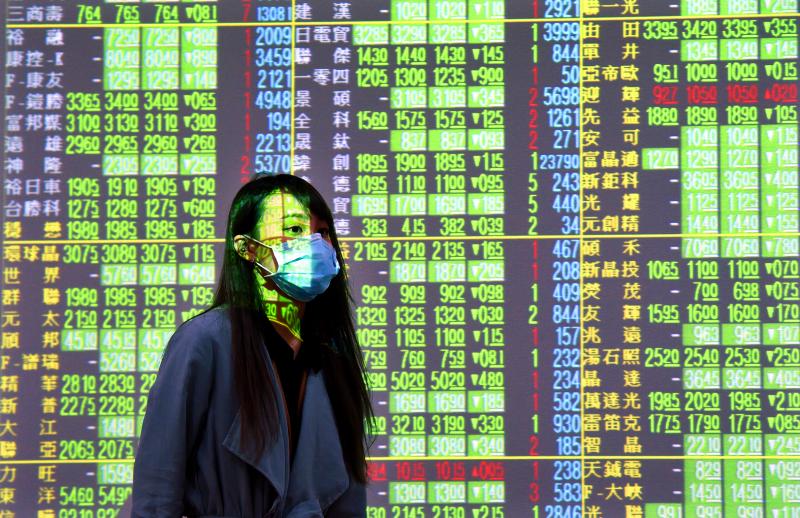The TAIEX yesterday retreated 5.83 percent to close at 8,681.34 points, the lowest in 42 months, as foreign and domestic institutional investors continue a sell-off amid the escalating worldwide spread of COVID-19, analysts said.
The benchmark index opened down 133.39 points at 9,085.28 — which was lower than the 10-year moving average of 9,110 points — and continued falling by a total of 695 points in the early morning session, before slowly rebounding to close down 537.33 points at the end of trading, Taiwan Stock Exchange (TWSE) data showed.
The TAIEX has fallen 28 percent from its peak of 12,179 points, registered on Jan. 14, a considerable and rarely seen drop, but analysts said that they could not predict the bottom for the market, given the ongoing spread of the coronavirus.

Photo: Liao Chen-huei, Taipei Times
“The deterioration in the local equity market could be attributed to sell-offs by foreign and domestic institutional investors. There will likely be a turning point once they stop selling, but it is hard to forecast when,” Capital Investment Trust Corp (群益投信) fund manager Daniel Tsai (蔡彥正) told the Taipei Times by telephone yesterday.
“Cash is king now. Institutional investors would prefer to decrease their holdings of risky assets, as they predict their value to decline amid volatile trading,” Tsai said.
Besides taking the “flight-to-quality” action, some institutional investors sold local shares after a computer-activated trading tool unleashed stop-loss orders when prices of stocks they bought earlier had declined more than 30 percent, Tsai said.
As the New Taiwan dollar yesterday weakened against the US dollar, it seemed that some foreign investors immediately moved funds out of Taiwan after selling local equities, partially to support their fund management businesses, he said.
Foreign institution investors yesterday sold a net NT$21.22 billion (US$695.6 million) of local shares, slightly down from the average of NT$28 billion they sold over the previous three days.
It would still take days to observe if the sell-offs would ease, he said.
Domestic securities investment trust companies also sold a net of NT$700 million of local shares, up from the previous three day’s average of NT$209 million, TWSE data showed.
“Quantitative easing monetary policy, rate cuts and expansionary fiscal policy would be a bit helpful, but not very likely to alter the trend. People do not lack funds, but they need to see effective treatments for COVID-19 before regaining confidence in the global economy,” Tsai said.

SEMICONDUCTORS: The German laser and plasma generator company will expand its local services as its specialized offerings support Taiwan’s semiconductor industries Trumpf SE + Co KG, a global leader in supplying laser technology and plasma generators used in chip production, is expanding its investments in Taiwan in an effort to deeply integrate into the global semiconductor supply chain in the pursuit of growth. The company, headquartered in Ditzingen, Germany, has invested significantly in a newly inaugurated regional technical center for plasma generators in Taoyuan, its latest expansion in Taiwan after being engaged in various industries for more than 25 years. The center, the first of its kind Trumpf built outside Germany, aims to serve customers from Taiwan, Japan, Southeast Asia and South Korea,

Gasoline and diesel prices at domestic fuel stations are to fall NT$0.2 per liter this week, down for a second consecutive week, CPC Corp, Taiwan (台灣中油) and Formosa Petrochemical Corp (台塑石化) announced yesterday. Effective today, gasoline prices at CPC and Formosa stations are to drop to NT$26.4, NT$27.9 and NT$29.9 per liter for 92, 95 and 98-octane unleaded gasoline respectively, the companies said in separate statements. The price of premium diesel is to fall to NT$24.8 per liter at CPC stations and NT$24.6 at Formosa pumps, they said. The price adjustments came even as international crude oil prices rose last week, as traders

SIZE MATTERS: TSMC started phasing out 8-inch wafer production last year, while Samsung is more aggressively retiring 8-inch capacity, TrendForce said Chipmakers are expected to raise prices of 8-inch wafers by up to 20 percent this year on concern over supply constraints as major contract chipmakers Taiwan Semiconductor Manufacturing Co (TSMC, 台積電) and Samsung Electronics Co gradually retire less advanced wafer capacity, TrendForce Corp (集邦科技) said yesterday. It is the first significant across-the-board price hike since a global semiconductor correction in 2023, the Taipei-based market researcher said in a report. Global 8-inch wafer capacity slid 0.3 percent year-on-year last year, although 8-inch wafer prices still hovered at relatively stable levels throughout the year, TrendForce said. The downward trend is expected to continue this year,

POWERING UP: PSUs for AI servers made up about 50% of Delta’s total server PSU revenue during the first three quarters of last year, the company said Power supply and electronic components maker Delta Electronics Inc (台達電) reported record-high revenue of NT$161.61 billion (US$5.11 billion) for last quarter and said it remains positive about this quarter. Last quarter’s figure was up 7.6 percent from the previous quarter and 41.51 percent higher than a year earlier, and largely in line with Yuanta Securities Investment Consulting Co’s (元大投顧) forecast of NT$160 billion. Delta’s annual revenue last year rose 31.76 percent year-on-year to NT$554.89 billion, also a record high for the company. Its strong performance reflected continued demand for high-performance power solutions and advanced liquid-cooling products used in artificial intelligence (AI) data centers,